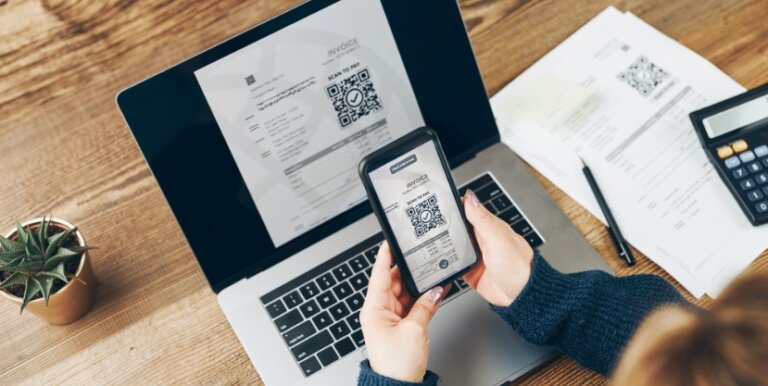In the digital age, electronic invoices are essential for businesses. But how do we ensure their security? Find out how accounting automation not only optimises processes, but also protects our electronic transactions.
Table of Contents
1. What is accounting automation?
Accounting automation refers to the use of technologies, software and systems to perform accounting tasks automatically, reducing or eliminating manual intervention. This automation can range from simple tasks, such as data entry and account reconciliation, to more complex processes, such as financial reporting and data analysis.
Some benefits of accounting automation include:
- Efficiency: It reduces the time required to complete accounting tasks, allowing accountants to focus on higher value-added activities.
- Accuracy: By minimising manual intervention, the risk of human error in data entry and calculations is reduced.
- Consistency: Ensures that processes are performed in the same way every time, resulting in more reliable data.
- Real-timeaccess: Automated systems often provide real-time access to financial information, which facilitates decision-making.
- Integration: Many accounting automation systems can be integrated with other business tools, such as customer relationship management (CRM) or enterprise resource planning (ERP) systems, providing a more holistic view of business operations.
With the evolution of technology, accounting automation has advanced significantly, and many companies are adopting digital solutions to modernise and optimise their accounting operations.
2. What is the importance of accounting automation?
Accounting automation plays a crucial role in the modernisation and efficiency of companies’ financial and accounting operations. Its importance can be highlighted in the following points:
- Operational efficiency: Automation significantly reduces the time spent on repetitive and manual tasks, allowing accounting staff to concentrate on higher value activities such as financial analysis and planning.
- Error reduction: By minimising human intervention, the potential for errors in data entry and calculations is reduced, leading to more accurate financial records.
- Cost savings: Although initial implementation may require an investment, in the long run, automation can result in significant savings in terms of time and human resources.
- Real-timeinformation: With automated systems, companies can access up-to-date financial data in real time, which facilitates quick decisions based on accurate information.
- Compliance and auditing: Accounting automation can help ensure that companies comply with accounting regulations and standards. It also facilitates the audit process by providing clear and traceable records.
- Scalability: As a company grows, its accounting operations can become more complex. Automated systems can adapt and handle larger volumes of transactions without compromising accuracy or efficiency.
- Integration with other systems: Modern accounting automation systems are often compatible with other business tools, allowing for seamless integration and a more complete view of the company’s operations.
- Security: Automated accounting systems typically have robust security measures in place to protect financial information against unauthorised access, data loss or cyber-attacks.
- Improved decision-making: With more accurate and accessible data, business leaders can make more informed decisions about company direction and strategy.
In short, accounting automation not only modernises and streamlines accounting operations, but can also be a strategic tool that drives a company’s growth and competitiveness in today’s marketplace.
3. What functions of an accounting process can be automated?
Automation has reached almost every aspect of accounting, allowing many tasks to be performed more efficiently and accurately. Some of the accounting tasks that can be automated include:
- Data entry: Systems can automatically import sales, purchase, expense and other transaction data from a variety of sources, reducing the need for manual entry.
- Bank reconciliation: Modern accounting software can automatically reconcile bank transactions with general ledger entries, identifying discrepancies and facilitating their resolution.
- Tax calculation: Automation can help calculate taxes based on current regulations, ensuring accuracy and compliance.
- Reporting: Systems can automatically generate financial reports, such as balance sheets, income statements and cash flows, based on the data entered.
- Accounts payable and receivable management: Automation can track and manage outstanding invoices, send payment reminders and process incoming payments.
- Payroll: Automated payroll systems can calculate salaries, deductions, taxes and other elements related to employee compensation.
- Asset depreciation: Automation can automatically calculate and record fixed asset depreciation based on the selected method and rate.
- Inventory control: Systems can automatically track inventory levels, generate alerts when levels are low, and assist with stock replenishment.
- Budgeting and forecasting: Some advanced accounting software can assist in creating budgets and financial projections based on historical data and trends.
- Integration with other systems: Automation enables seamless integration with other business systems, such as customer relationship management (CRM) systems, enterprise resource planning (ERP) systems and e-commerce platforms.
- Security and backup: Modern accounting systems often include automatic backup functions and security measures to protect information.
- Regulatory updates: Some systems automatically update to reflect changes in accounting or tax regulations, ensuring compliance.
These are just some of the tasks that can be automated in the accounting environment. The key is to select and configure the right software to meet the specific needs of the business and ensure that staff are properly trained to use it effectively.

4. How can Accounting Automation help ensure the security of electronic invoices?
Accounting automation, when properly implemented and managed, can play a crucial role in ensuring the security of e-invoices. Here are some of the ways in which this is possible:
- Authentication and authorisation: Automated accounting systems often have strong authentication mechanisms, such as two-factor authentication, to ensure that only authorised users have access. This limits the risk of unauthorised access to electronic invoices.
- Audit trail: Modern systems keep detailed records of all actions taken, including changes to invoices. This not only helps in detecting suspicious activity, but also provides a clear trail in case of audits or investigations.
- Encryption: Information, including electronic invoices, is stored and transmitted using advanced encryption techniques, protecting data against interception or unauthorised access.
- Data integrity: Accounting automation can ensure that invoices are not altered once issued, using digital seals or electronic signatures to validate the integrity of documents.
- Backup and recovery: Automated systems often have automated backup solutions, ensuring that electronic invoices are stored securely and can be recovered in the event of data loss or system failure.
- Automatic updates: Accounting software is regularly updated to address known vulnerabilities and improve security. Automation ensures that these updates are applied in a timely manner.
- Automatic validation: Systems can automatically validate invoices against purchase orders or contracts to detect discrepancies or duplicate invoices, reducing the risk of fraud.
- Access control: Automation allows differentiated levels of access to be established. For example, an employee might have permission to view an invoice, but not to modify it.
- Notifications and alerts: Systems can be configured to send alerts in case of unusual activity, such as the issuance of a large number of invoices in a short period of time.
- Integration with other platforms: Accounting automation can be integrated with other security solutions, such as intrusion detection systems or identity management platforms, to provide an additional layer of protection.
In short, accounting automation not only offers efficiency and accuracy in e-invoice management, but also incorporates multiple layers of security to protect the integrity, confidentiality and availability of these vital documents.
4.1 Benefits of e-invoices for businesses
E-invoices offer a number of tangible and intangible benefits for businesses. Here are some of the most salient:
- Cost reduction: E-invoices eliminate or significantly reduce the costs associated with printing, paper, mailing, physical storage and manual invoice handling.
- Faster processing: Issuing, sending and receiving e-invoices is almost immediate, speeding up invoicing and payment cycles.
- Improved accuracy: By reducing manual intervention, the risk of human error in data entry, which can lead to discrepancies and delays, is minimised.
- Streamlined workflow: e-invoicing solutions are often integrated with other business systems, enabling smoother and more automated management of finances.
- Easy access and retrieval: E-invoices can be easily stored and retrieved from digital systems, facilitating queries and audits.
- Improved cash management: With a clearer, real-time view of outstanding and paid invoices, businesses can better manage their cash flow and plan their finances.
- Improved security: Electronic invoices can be protected with security measures, such as encryption and authentication, ensuring confidentiality and integrity of information.
- Sustainability: By reducing the need for paper, companies can reduce their environmental impact and promote more sustainable business practices.
- Regulatory compliance: In many countries, e-invoices are regulated and provide mechanisms to ensure the authenticity and integrity of documents, facilitating compliance with tax and accounting regulations.
- Supplier and customer relations: E-invoicing can improve supplier and customer satisfaction by offering faster, more transparent and efficient processes.
- Reduced storage space: By not having to store paper invoices, companies can free up physical space and reduce costs associated with storage.
- Integration with other systems: E-invoices can be easily integrated with accounting, customer relationship management (CRM) and other business systems, providing a more holistic view of operations.
In short, e-invoices offer companies a more efficient, secure and sustainable way to manage their financial operations, which can result in significant savings and better overall business management.
5. Is it safe to store digitised accounting documents such as e-invoices in the cloud?
Storing digitised accounting documents, such as e-invoices, in the cloud can be safe if the right precautions are taken. However, as with any technology, there are associated risks that need to be managed. Below are some advantages and security considerations when storing accounting documents in the cloud:
5.1 Advantages of storing accounting documents in the cloud
- Accessibility: Documents stored in the cloud can be accessed from anywhere with an internet connection, making it easier to manage and consult the information.
- Backup and recovery: Cloud service providers often offer automatic backup solutions and recovery options in case of data loss.
- Security updates: Cloud service providers often keep their systems up-to-date against the latest threats and vulnerabilities.
- Cost reduction: Storing documents in the cloud can be cheaper than maintaining physical infrastructure and in-house backup systems.
5.2 Security considerations
- Choose a trusted provider: It is critical to select a cloud service provider with a strong reputation for security and compliance.
- Encryption: Ensure that your data is encrypted both in transit (when transmitted) and at rest (when stored) in the cloud.
- Multi-factor authentication: Implement two-factor or multi-factor authentication to access your documents stored in the cloud.
- Access policies: Establish and manage access policies to ensure that only authorised individuals can access accounting documents.
- Audit logging: Use services that provide detailed logs of all activities related to your documents, such as who accessed them and when.
- Regulatory compliance: Ensure that cloud storage complies with regulations and standards applicable to your industry or region, especially with regard to data protection and privacy.
- Service level agreements (SLAs): Review the provider’s SLAs to understand their commitments in terms of data availability, backup and recovery.
- Regular security assessments: Conduct or request regular security assessments to identify and address potential vulnerabilities.
In summary, storing digitised accounting documents in the cloud can be secure if the right measures are taken. It is essential to stay informed about security best practices and work closely with cloud service providers to ensure your data is protected.
Accounting automation is essential in the modern business world, as it allows companies to manage their finances more efficiently, accurately and securely. In this context, solutions such as Tickelia emerge as key tools to take automation to the next level, specifically in the area of corporate expense management.
Tickelia, as an end-to-end digital solution, encapsulates the essence of accounting automation. It allows employees to easily record expenses, eliminating the need for tedious and error-prone manual processes. This ease of recording, combined with the tool’s ability to adapt to various formats, reflects how accounting automation can be flexible and responsive to changing market needs.
Beyond simple data entry, the true power of accounting automation is manifested in features such as Tickelia’s customised alerts. These ensure that company expense policies are adhered to, providing automatic controls that previously required extensive manual reviews. Fraud prevention, such as duplicate expense detection, is another area where automation provides added value, ensuring the company’s financial integrity.
From a broader perspective, once expenses are approved, accounting automation facilitated by Tickelia simplifies complex and critical tasks. Settlement, accounting, card reconciliation and communication with regulatory bodies, such as the Spanish Tax Agency’s SII, are handled automatically, reducing the margin for error and freeing staff to concentrate on strategic tasks.
In short, Tickelia exemplifies the importance of accounting automation in corporate expense management. By integrating processes, ensuring compliance and providing detailed analytics, this tool demonstrates how accounting automation is not just a trend, but a necessity for companies looking to optimise their financial operations in the 21st century.









